2013版初中英语全程复习方略课件(教材复习案)八年级下册 Units 9、10(人教版 遵义专用)
文档属性
| 名称 | 2013版初中英语全程复习方略课件(教材复习案)八年级下册 Units 9、10(人教版 遵义专用) |
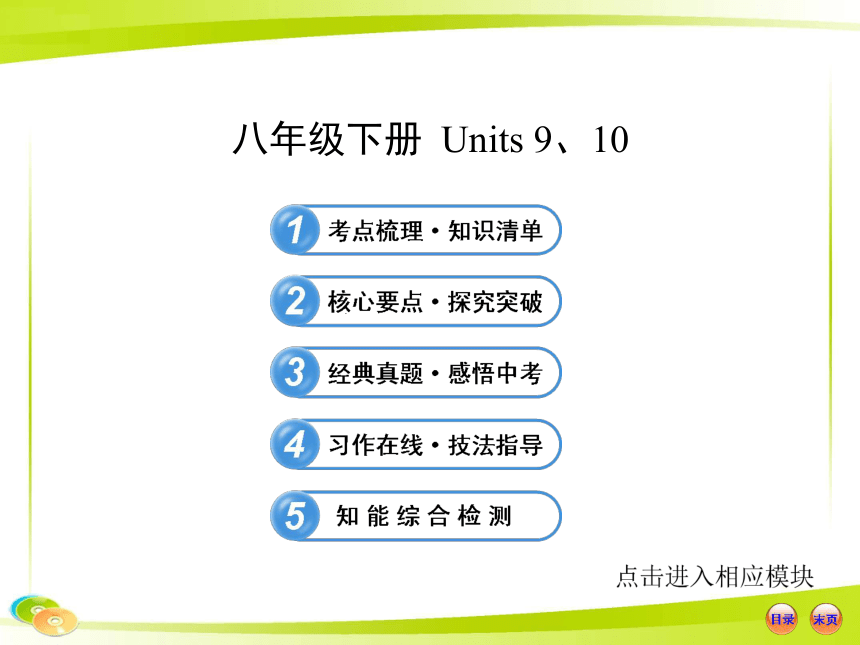
|
|
| 格式 | zip | ||
| 文件大小 | 1.0MB | ||
| 资源类型 | 教案 | ||
| 版本资源 | 人教新目标(Go for it)版 | ||
| 科目 | 英语 | ||
| 更新时间 | 2014-02-27 00:00:00 | ||
图片预览

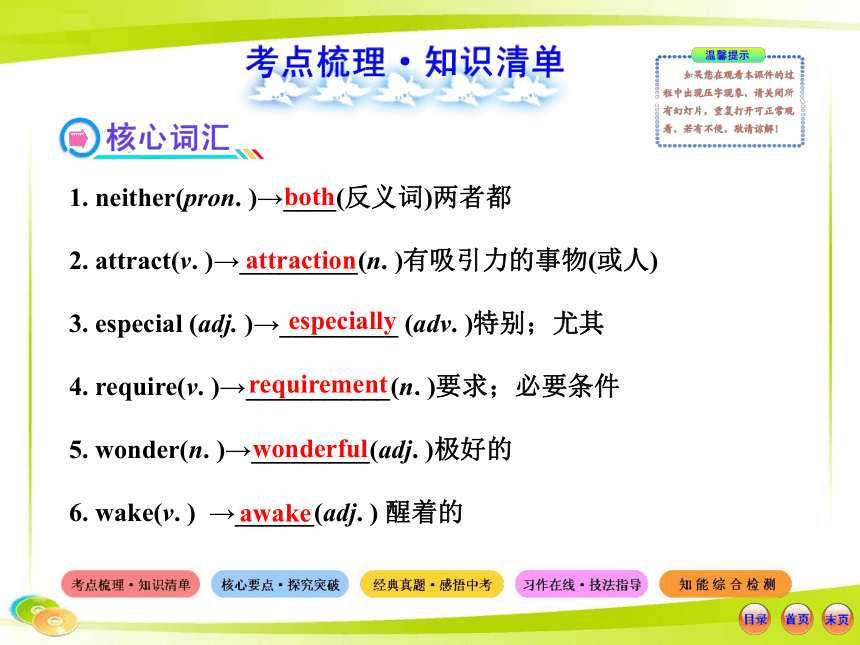
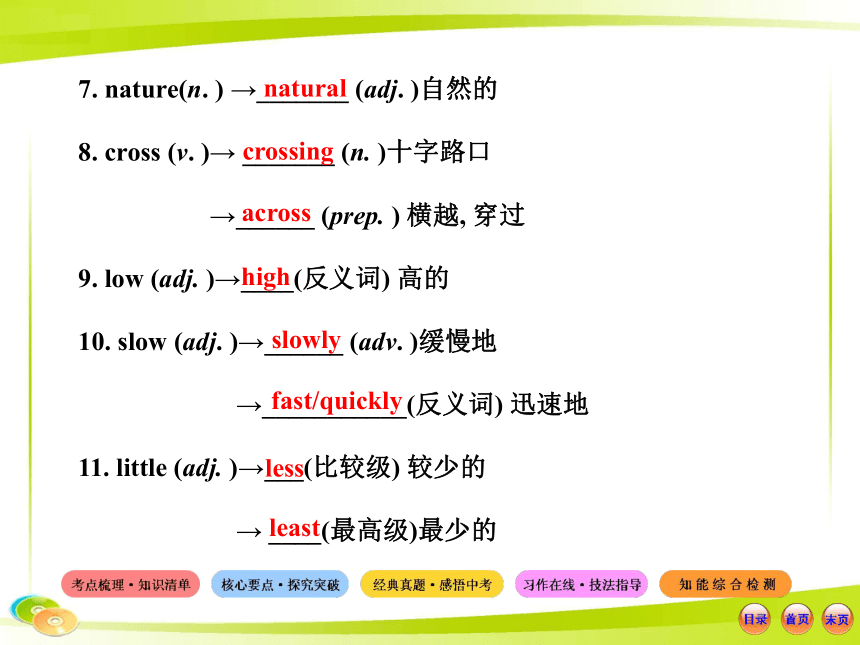
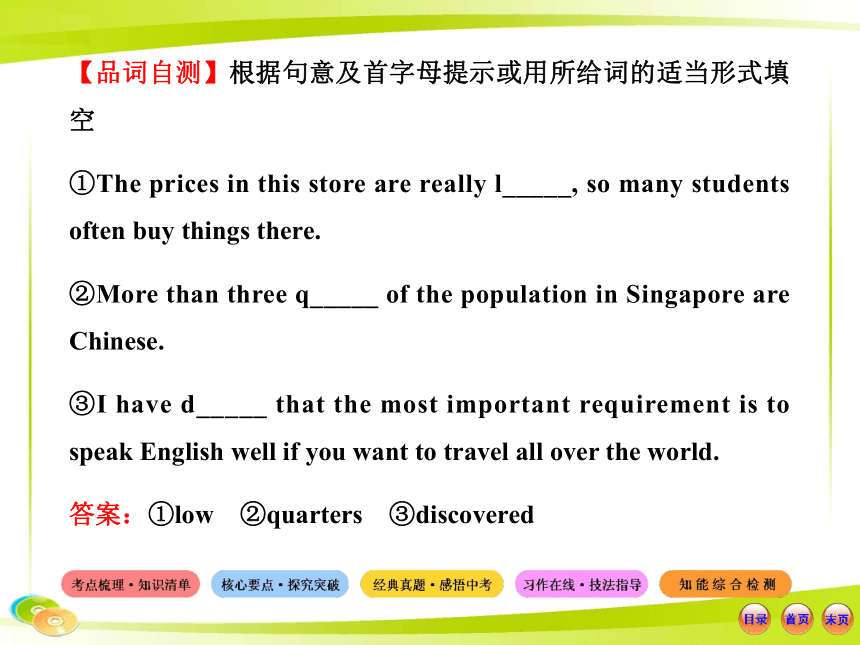
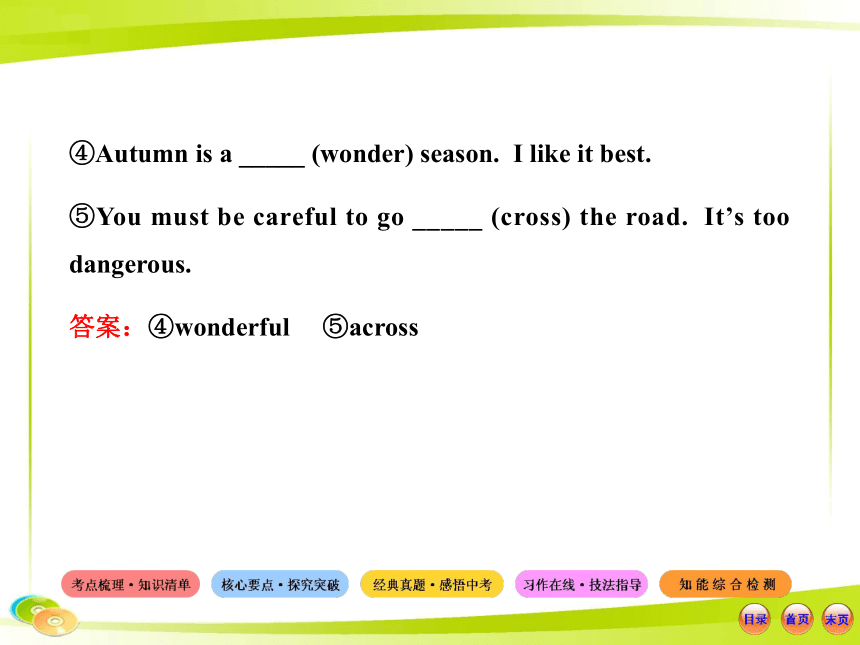
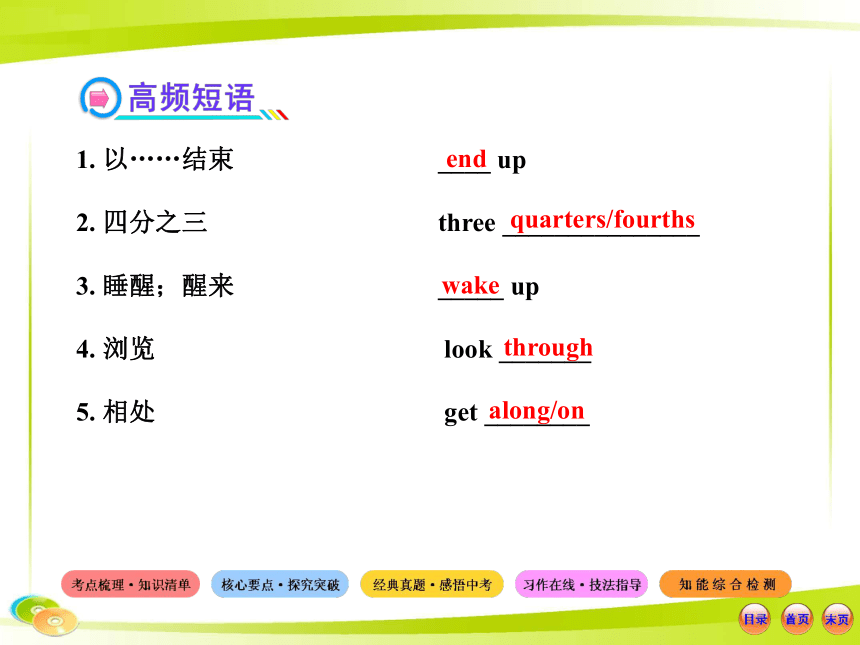
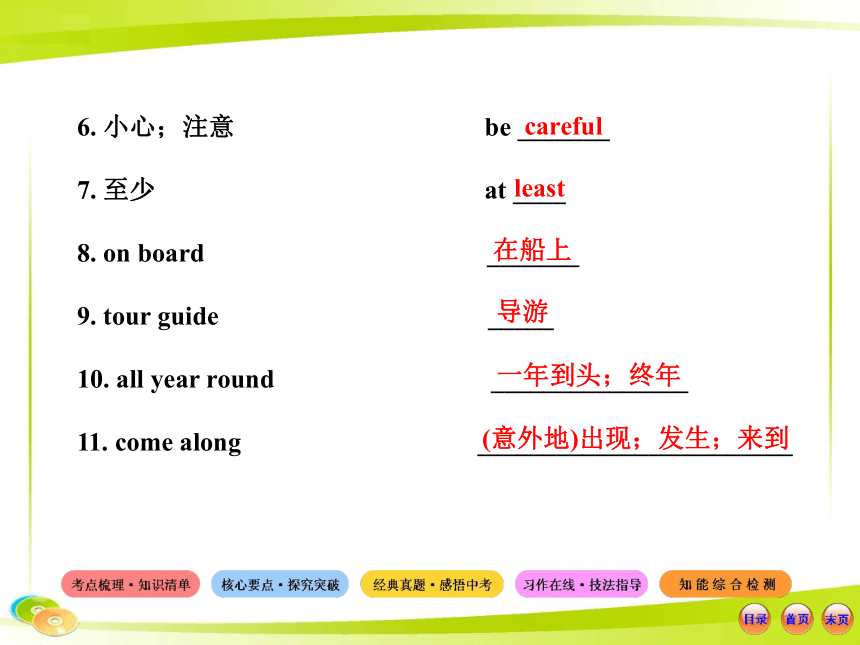
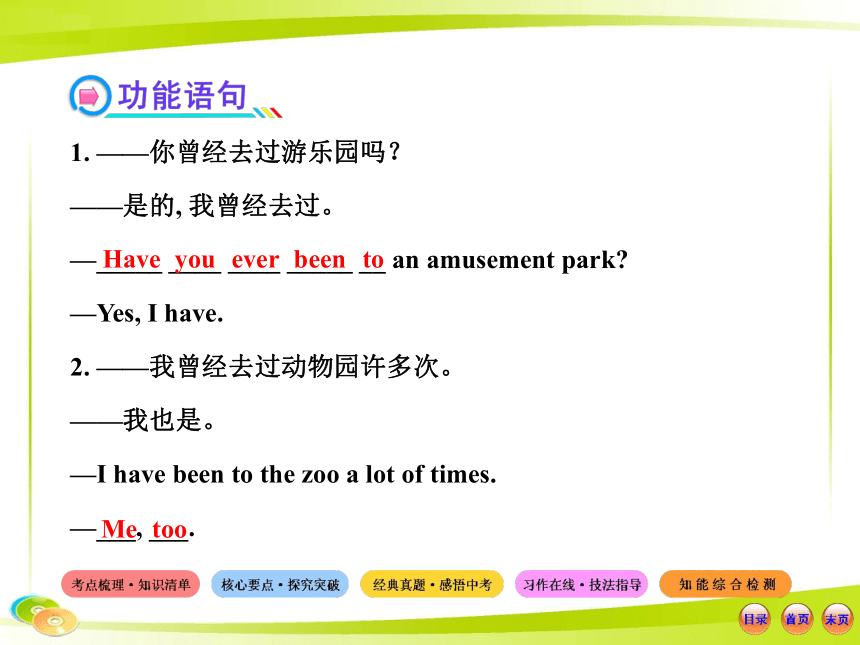
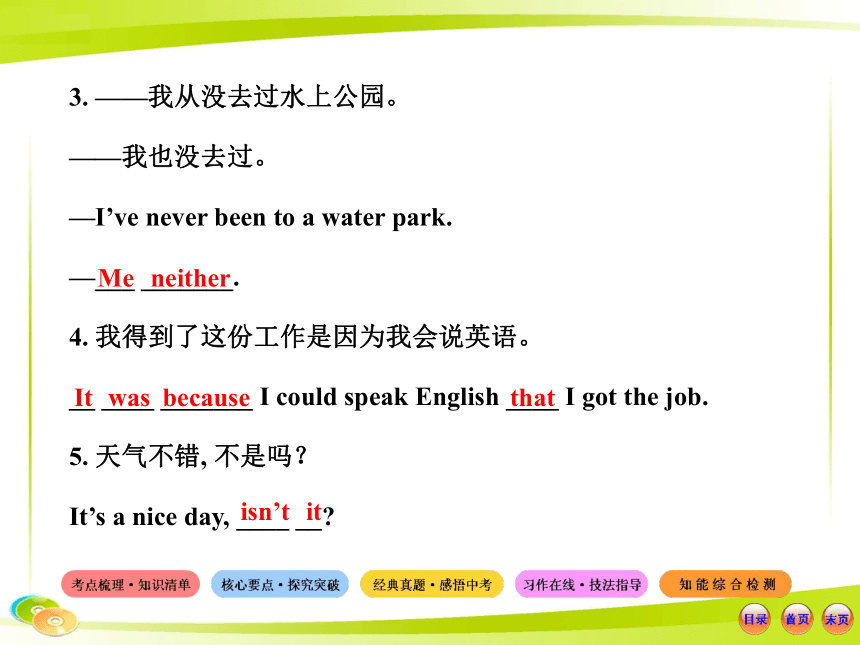
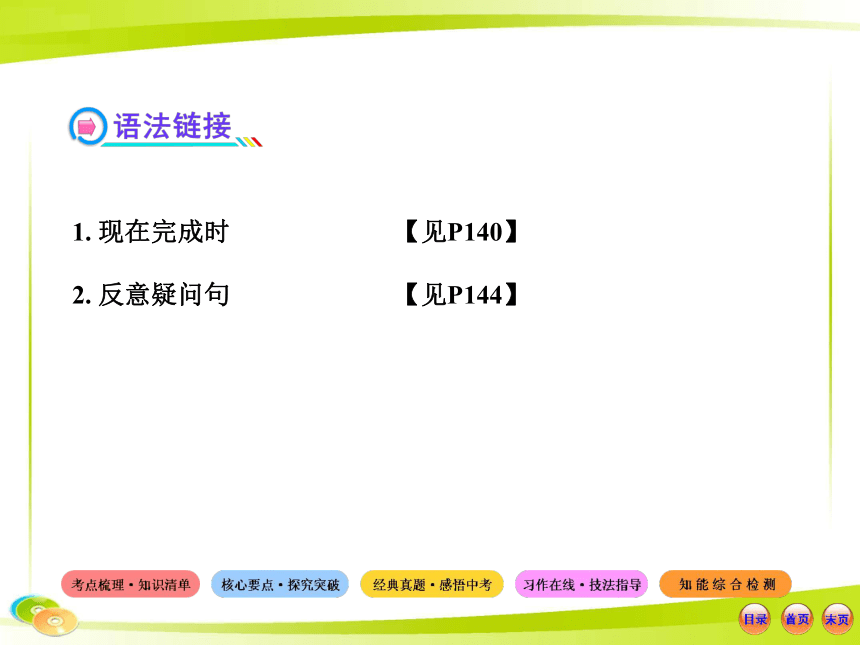
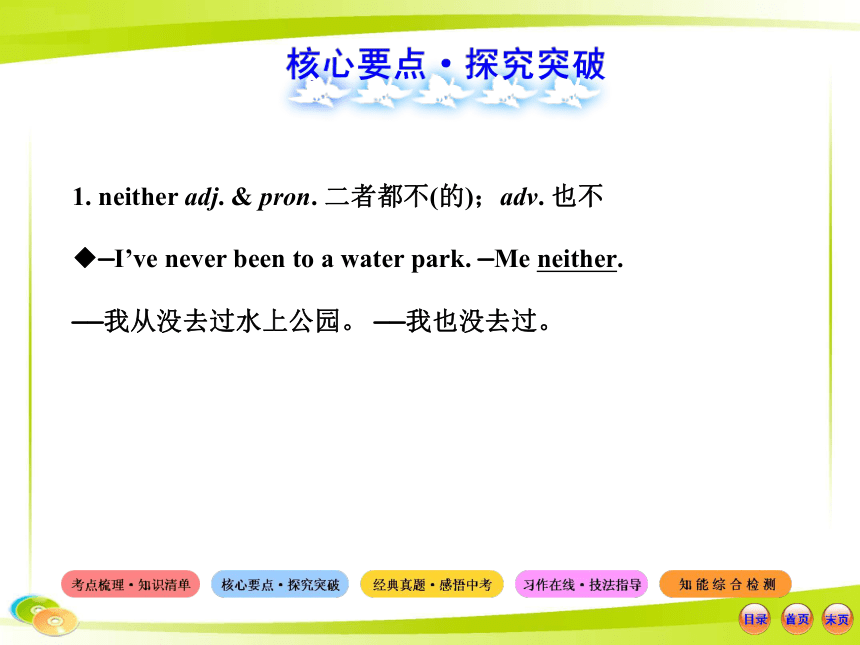
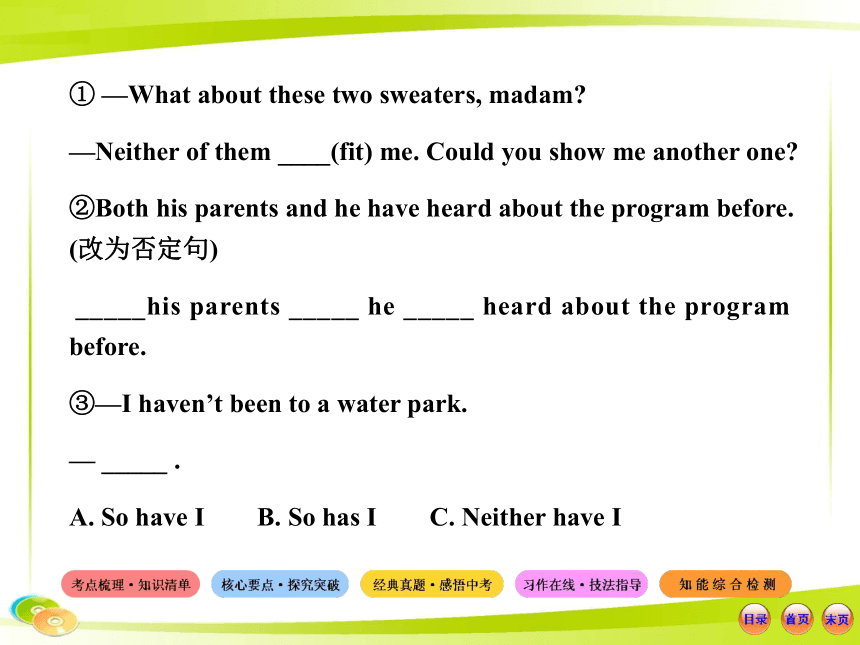
文档简介
课件41张PPT。八年级下册 Units 9、101. neither(pron. )→____(反义词)两者都
2. attract(v. )→_________(n. )有吸引力的事物(或人)
3. especial (adj. )→_________ (adv. )特别;尤其
4. require(v. )→___________(n. )要求;必要条件
5. wonder(n. )→_________(adj. )极好的
6. wake(v. ) →______(adj. ) 醒着的bothattractionespeciallyrequirementwonderfulawake7. nature(n. ) →_______ (adj. )自然的
8. cross (v. )→ _______ (n. )十字路口
→______ (prep. ) 横越, 穿过
9. low (adj. )→____(反义词) 高的
10. slow (adj. )→______ (adv. )缓慢地
→___________(反义词) 迅速地
11. little (adj. )→___(比较级) 较少的
→ ____(最高级)最少的 naturalcrossingacrosshighslowlyfast/quicklylessleast【品词自测】根据句意及首字母提示或用所给词的适当形式填空
①The prices in this store are really l_____, so many students often buy things there.
②More than three q_____ of the population in Singapore are Chinese.
③I have d_____ that the most important requirement is to speak English well if you want to travel all over the world.
答案:①low ②quarters ③discovered④Autumn is a _____ (wonder) season. I like it best.
⑤You must be careful to go _____ (cross) the road. It’s too dangerous.
答案:④wonderful ⑤across1. 以……结束 ____ up
2. 四分之三 three _______________
3. 睡醒;醒来 _____ up
4. 浏览 look _______
5. 相处 get ________endquarters/fourthswakethroughalong/on6. 小心;注意 be _______
7. 至少 at ____
8. on board _______
9. tour guide _____
10. all year round _______________
11. come along ________________________carefulleast在船上导游一年到头;终年(意外地)出现;发生;来到1. ——你曾经去过游乐园吗?
——是的, 我曾经去过。
—_____ ____ ____ _____ __ an amusement park?
—Yes, I have.
2. ——我曾经去过动物园许多次。
——我也是。
—I have been to the zoo a lot of times.
—___, ___. HaveyoueverbeentoMetoo3. ——我从没去过水上公园。
——我也没去过。
—I’ve never been to a water park.
—___ _______.
4. 我得到了这份工作是因为我会说英语。
__ ____ _______ I could speak English ____ I got the job.
5. 天气不错, 不是吗?
It’s a nice day, ____ __? MeneitherItwasbecausethatisn’tit1. 现在完成时 【见P140】
2. 反意疑问句 【见P144】1. neither adj. & pron. 二者都不(的);adv. 也不
◆—I’ve never been to a water park. —Me neither.
——我从没去过水上公园。 ——我也没去过。① —What about these two sweaters, madam?
—Neither of them ____(fit) me. Could you show me another one?
②Both his parents and he have heard about the program before. (改为否定句)
_____his parents _____ he _____ heard about the program before.
③—I haven’t been to a water park.
— _____ .
A. So have I B. So has I C. Neither have I【自主归纳】 neither的用法总结both. . . and. . . 【判断抢答】判断下面句子翻译正误
这两个女孩都不擅长打排球。
①Neither of the two girls do well in playing volleyball. ( )
②Neither of the two girls does well in playing volleyball. ( )
答案:①fits ②Neither; nor; has ③C×√2. population n. 人口
◆. . . , more than three quarters of the population are Chinese. . .
……, 多于四分之三的人口是中国人……①The population of that village _____(be) about 2, 000, and nearly half of the population _____ (be) the old.
②The population of China is _____ than that of any other country in the world.
A. larger B. fewer C. smaller
③The population of Hong Kong is about seven million. (对画线部分提问)
_____ _____ the population of Hong Kong? 【自主归纳】population的三考点
(1)population是集合名词, 是指人口总数, 作主语时, 谓语动词一般用单数形式, 如果表示个体概念, 被分数或百分数修饰时, 谓语动词用复数。
(2)人口“多”用_____/ ___;“少”用small;不用many/ much/ few/ little等修饰。
(3)提问人口数量时, 一般要用What’s the population of. . . ? 相当于How large is the population of. . . ?
答案:①is; are ②A ③What islargebig3. Have you ever been to an amusement park?
你曾经去过游乐园吗?
①Mr. Li _______ Britain several times. Tomorrow he will give us a talk about British culture.
A. has gone to B. have gone to
C. has been to②—Could I speak to Linda?
—Sorry, she isn’t in. She _______ to the school library.
A. has been B. has gone
C. is going
③他们在遵义已经待了两周了。
They _______ _______ _______ Zunyi for two weeks. 【自主归纳】have been to/ have gone to/ have been in辨析have been tohave gone to答案:①C ②B ③have been in Ⅰ. 用所给词的正确形式填空
1. (2012·恩施中考)Many foreigners enjoy Chinese fashion, _____ (especial) the Tang costume.
2. (2012·滨州中考)Mr. Liu isn’t here now. He _____(go) to Beijing.
3. (2012·无锡中考)—Is everybody here?
—No, Sir. Jim _____(not arrive) yet. He is still on the way.
答案:1. especially 2. has gone 3. hasn’t arrivedⅡ. 单项选择
1. (2012·贵阳中考)“Have you ever been to Tokyo? ”“Yes. I ______ there twice. It’s a modern city. ”
A. have gone B. have been
C. had gone
【解析】选B。have been“去过某地(已不在那儿了)”;have gone“去了某地”, 表示到了某地或正在去某地的途中。2. (2012·杭州中考)Mark _____ in China for 10 years and now he teaches Chinese in Britain.
A. has worked
B. worked
C. had worked
D. is working【解析】选B。考查现在完成时和一般过去时的区别。现在完成时强调过去发生的动作对现在造成的影响或表示从过去一直持续到现在的动作;一般现在时着重强调经常性、习惯性的动作; 一般过去时强调某个动作发生在过去并已结束。句意为“马克在中国工作了十年, 现在他在英国教汉语。”由后半句可知他现在不在中国工作了, 符合一般过去时的用法。故选B。3. (2012·福州中考) _____ my father _____ my mother take good care of me. I love them so much.
A. Either; or B. Both; and C. Neither; nor
【解析】选B。考查不定代词的用法。either. . . or和neither. . . nor连接两个主语时, 谓语动词遵循“就近原则”。此句的谓语动词是take, 所以应该是“爸爸和妈妈都很照顾我。我很爱他们”, 故选B。4. (2012·济宁中考) Sam likes trekking _____ the jungle, because he thinks it’s exciting.
A. over B. under
C. across D. through
【解析】选D。across指在物体的表面“穿过”, 一般指横穿;through指在物体的内部“穿过”。由“the jungle”可知选D项。5. (2012·枣庄中考)Peter has never been to a water park. _____ .
A. I haven’t neither B. I haven’t too
C. Me too D. Me neither
【解析】选D。Me neither. 表示否定的情况;Me too. 表示肯定的情况, 由上句中“never”可知选D项。6. (2012·济南中考)—How long can I _____ the book?
—For three weeks. But you can’t lend it to others.
A. see B. borrow
C. keep D. look
【解析】选C。由问句中的“How long”可知应用延续性动词, see/borrow/look都是非延续性动词。7. (2012·广安中考)—Why don’t you go to the movie with me, Betty?
—Because I _____ it before.
A. saw B. have seen C. see
【解析】选B。由语境可知我以前看过这部电影, 故用现在完成时。 写感谢信是历年许多地市中考考查频率较高的话题之一, 其中以帮助学习、帮助照顾宠物为背景设题最为常见。在写作此类话题作文过程中要特别注意:1. 书信的书写格式;2. 感谢的原因。 【典题示例】
假设你是一名中学生, 名叫李华, 曾经到英国学习、生活了三个月。期间, 你住在大卫(David)家。现在学习已结束, 你刚回到家, 特意给大卫写一封70词左右的英文信, 内容包括以下方面:要求:1. 信件内容要包含所给的提示信息, 可适当发挥。
2. 信的开头和结尾部分已给出, 不计入总词数。
3. 文中不得出现真实的人名与校名。
参考词汇:culture(文化), invite(邀请)Dear David,
I’ve just got back home. I want to say “Thank you” most at the moment. ___________________________________________
__________________________________________________________________________________________________________________________________________________________________
Yours,
Li Hua【审题谋篇】1. 本文是一封感谢信, 属于应用文文体。
2. 人称:第一人称和第二人称。
3. 主要时态:运用一般现在时和一般过去时。
4. 高分模板:【佳作诵读】
Dear David,
I’ve just got back home. I want to say “Thank you” most at the moment. During my stay with your family, I was well looked after. You helped me with my English and showed me around many places. When I was ill, your parents sent me to hospital and prepared delicious food for me. So I got well soon. With your help, my English has greatly improved and I’ve learned more about your culture. Thank you for what you have done!
I’d like to invite you to visit my family soon.
Yours,
Li Hua【名师点睛】
(1)内容简明、具体;作者不仅在学习上得到了大卫的帮助, 在生活上还得到了大卫父母的帮助;感情饱满、生动。
(2)表达的方式采取叙述、抒情相结合的方式, 如I want to say “Thank you” most at the moment. During my stay with your family, I was well looked after.
(3)作者灵活运用多种句式, 如When I was ill, your parents sent me to hospital and prepared delicious food for me. With your help, my English has greatly improved and I’ve learned more about your culture. 等, 使语句错落有致, 文章丰富多彩。
2. attract(v. )→_________(n. )有吸引力的事物(或人)
3. especial (adj. )→_________ (adv. )特别;尤其
4. require(v. )→___________(n. )要求;必要条件
5. wonder(n. )→_________(adj. )极好的
6. wake(v. ) →______(adj. ) 醒着的bothattractionespeciallyrequirementwonderfulawake7. nature(n. ) →_______ (adj. )自然的
8. cross (v. )→ _______ (n. )十字路口
→______ (prep. ) 横越, 穿过
9. low (adj. )→____(反义词) 高的
10. slow (adj. )→______ (adv. )缓慢地
→___________(反义词) 迅速地
11. little (adj. )→___(比较级) 较少的
→ ____(最高级)最少的 naturalcrossingacrosshighslowlyfast/quicklylessleast【品词自测】根据句意及首字母提示或用所给词的适当形式填空
①The prices in this store are really l_____, so many students often buy things there.
②More than three q_____ of the population in Singapore are Chinese.
③I have d_____ that the most important requirement is to speak English well if you want to travel all over the world.
答案:①low ②quarters ③discovered④Autumn is a _____ (wonder) season. I like it best.
⑤You must be careful to go _____ (cross) the road. It’s too dangerous.
答案:④wonderful ⑤across1. 以……结束 ____ up
2. 四分之三 three _______________
3. 睡醒;醒来 _____ up
4. 浏览 look _______
5. 相处 get ________endquarters/fourthswakethroughalong/on6. 小心;注意 be _______
7. 至少 at ____
8. on board _______
9. tour guide _____
10. all year round _______________
11. come along ________________________carefulleast在船上导游一年到头;终年(意外地)出现;发生;来到1. ——你曾经去过游乐园吗?
——是的, 我曾经去过。
—_____ ____ ____ _____ __ an amusement park?
—Yes, I have.
2. ——我曾经去过动物园许多次。
——我也是。
—I have been to the zoo a lot of times.
—___, ___. HaveyoueverbeentoMetoo3. ——我从没去过水上公园。
——我也没去过。
—I’ve never been to a water park.
—___ _______.
4. 我得到了这份工作是因为我会说英语。
__ ____ _______ I could speak English ____ I got the job.
5. 天气不错, 不是吗?
It’s a nice day, ____ __? MeneitherItwasbecausethatisn’tit1. 现在完成时 【见P140】
2. 反意疑问句 【见P144】1. neither adj. & pron. 二者都不(的);adv. 也不
◆—I’ve never been to a water park. —Me neither.
——我从没去过水上公园。 ——我也没去过。① —What about these two sweaters, madam?
—Neither of them ____(fit) me. Could you show me another one?
②Both his parents and he have heard about the program before. (改为否定句)
_____his parents _____ he _____ heard about the program before.
③—I haven’t been to a water park.
— _____ .
A. So have I B. So has I C. Neither have I【自主归纳】 neither的用法总结both. . . and. . . 【判断抢答】判断下面句子翻译正误
这两个女孩都不擅长打排球。
①Neither of the two girls do well in playing volleyball. ( )
②Neither of the two girls does well in playing volleyball. ( )
答案:①fits ②Neither; nor; has ③C×√2. population n. 人口
◆. . . , more than three quarters of the population are Chinese. . .
……, 多于四分之三的人口是中国人……①The population of that village _____(be) about 2, 000, and nearly half of the population _____ (be) the old.
②The population of China is _____ than that of any other country in the world.
A. larger B. fewer C. smaller
③The population of Hong Kong is about seven million. (对画线部分提问)
_____ _____ the population of Hong Kong? 【自主归纳】population的三考点
(1)population是集合名词, 是指人口总数, 作主语时, 谓语动词一般用单数形式, 如果表示个体概念, 被分数或百分数修饰时, 谓语动词用复数。
(2)人口“多”用_____/ ___;“少”用small;不用many/ much/ few/ little等修饰。
(3)提问人口数量时, 一般要用What’s the population of. . . ? 相当于How large is the population of. . . ?
答案:①is; are ②A ③What islargebig3. Have you ever been to an amusement park?
你曾经去过游乐园吗?
①Mr. Li _______ Britain several times. Tomorrow he will give us a talk about British culture.
A. has gone to B. have gone to
C. has been to②—Could I speak to Linda?
—Sorry, she isn’t in. She _______ to the school library.
A. has been B. has gone
C. is going
③他们在遵义已经待了两周了。
They _______ _______ _______ Zunyi for two weeks. 【自主归纳】have been to/ have gone to/ have been in辨析have been tohave gone to答案:①C ②B ③have been in Ⅰ. 用所给词的正确形式填空
1. (2012·恩施中考)Many foreigners enjoy Chinese fashion, _____ (especial) the Tang costume.
2. (2012·滨州中考)Mr. Liu isn’t here now. He _____(go) to Beijing.
3. (2012·无锡中考)—Is everybody here?
—No, Sir. Jim _____(not arrive) yet. He is still on the way.
答案:1. especially 2. has gone 3. hasn’t arrivedⅡ. 单项选择
1. (2012·贵阳中考)“Have you ever been to Tokyo? ”“Yes. I ______ there twice. It’s a modern city. ”
A. have gone B. have been
C. had gone
【解析】选B。have been“去过某地(已不在那儿了)”;have gone“去了某地”, 表示到了某地或正在去某地的途中。2. (2012·杭州中考)Mark _____ in China for 10 years and now he teaches Chinese in Britain.
A. has worked
B. worked
C. had worked
D. is working【解析】选B。考查现在完成时和一般过去时的区别。现在完成时强调过去发生的动作对现在造成的影响或表示从过去一直持续到现在的动作;一般现在时着重强调经常性、习惯性的动作; 一般过去时强调某个动作发生在过去并已结束。句意为“马克在中国工作了十年, 现在他在英国教汉语。”由后半句可知他现在不在中国工作了, 符合一般过去时的用法。故选B。3. (2012·福州中考) _____ my father _____ my mother take good care of me. I love them so much.
A. Either; or B. Both; and C. Neither; nor
【解析】选B。考查不定代词的用法。either. . . or和neither. . . nor连接两个主语时, 谓语动词遵循“就近原则”。此句的谓语动词是take, 所以应该是“爸爸和妈妈都很照顾我。我很爱他们”, 故选B。4. (2012·济宁中考) Sam likes trekking _____ the jungle, because he thinks it’s exciting.
A. over B. under
C. across D. through
【解析】选D。across指在物体的表面“穿过”, 一般指横穿;through指在物体的内部“穿过”。由“the jungle”可知选D项。5. (2012·枣庄中考)Peter has never been to a water park. _____ .
A. I haven’t neither B. I haven’t too
C. Me too D. Me neither
【解析】选D。Me neither. 表示否定的情况;Me too. 表示肯定的情况, 由上句中“never”可知选D项。6. (2012·济南中考)—How long can I _____ the book?
—For three weeks. But you can’t lend it to others.
A. see B. borrow
C. keep D. look
【解析】选C。由问句中的“How long”可知应用延续性动词, see/borrow/look都是非延续性动词。7. (2012·广安中考)—Why don’t you go to the movie with me, Betty?
—Because I _____ it before.
A. saw B. have seen C. see
【解析】选B。由语境可知我以前看过这部电影, 故用现在完成时。 写感谢信是历年许多地市中考考查频率较高的话题之一, 其中以帮助学习、帮助照顾宠物为背景设题最为常见。在写作此类话题作文过程中要特别注意:1. 书信的书写格式;2. 感谢的原因。 【典题示例】
假设你是一名中学生, 名叫李华, 曾经到英国学习、生活了三个月。期间, 你住在大卫(David)家。现在学习已结束, 你刚回到家, 特意给大卫写一封70词左右的英文信, 内容包括以下方面:要求:1. 信件内容要包含所给的提示信息, 可适当发挥。
2. 信的开头和结尾部分已给出, 不计入总词数。
3. 文中不得出现真实的人名与校名。
参考词汇:culture(文化), invite(邀请)Dear David,
I’ve just got back home. I want to say “Thank you” most at the moment. ___________________________________________
__________________________________________________________________________________________________________________________________________________________________
Yours,
Li Hua【审题谋篇】1. 本文是一封感谢信, 属于应用文文体。
2. 人称:第一人称和第二人称。
3. 主要时态:运用一般现在时和一般过去时。
4. 高分模板:【佳作诵读】
Dear David,
I’ve just got back home. I want to say “Thank you” most at the moment. During my stay with your family, I was well looked after. You helped me with my English and showed me around many places. When I was ill, your parents sent me to hospital and prepared delicious food for me. So I got well soon. With your help, my English has greatly improved and I’ve learned more about your culture. Thank you for what you have done!
I’d like to invite you to visit my family soon.
Yours,
Li Hua【名师点睛】
(1)内容简明、具体;作者不仅在学习上得到了大卫的帮助, 在生活上还得到了大卫父母的帮助;感情饱满、生动。
(2)表达的方式采取叙述、抒情相结合的方式, 如I want to say “Thank you” most at the moment. During my stay with your family, I was well looked after.
(3)作者灵活运用多种句式, 如When I was ill, your parents sent me to hospital and prepared delicious food for me. With your help, my English has greatly improved and I’ve learned more about your culture. 等, 使语句错落有致, 文章丰富多彩。
